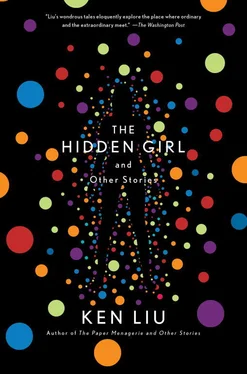After an hour, they arrived at a clearing in the woods. At the other end of the clearing was the dark maw of a cave that led underground. A stream flowed into the cave, the tinkling made loud by echoes against the wall of the cave.
Takako felt the malevolence in that cave. She seemed to hear groans, shrieks, accusatory screams that grew louder the longer she stood there. Her knees felt weak. Before she could stop herself, she knelt down, leaned forward and put her hands and forehead against the ground, and said, in a language she had not used for so long that it sounded strange to her own ears: “Munoo yuu iyuru mun.” Speak well of others.
The sounds quieted, and she looked up to see Akiba standing by, looking down at her with an unreadable expression.
“I’m sorry,” she said, and prostrated herself before him. “My grandmother and mother spoke to me in Uchinaaguchi when I was a small girl.”
She remembered the stories that her mother had told her, about how when her mother was a schoolgirl in Okinawa the teacher would make her wear a batsu fuda around her neck, a placard that announced that she was a bad student for speaking Okinawan instead of Japanese. Her mother had come from a long line of yuta , women skilled in communicating with the spirits of the dead. The mainlanders had said that yuta and nuuru priestesses were primitive superstitions dangerous to national unity, practices that had to be stamped out so that Okinawans could be cleansed of their impure taint and become full members of the Japanese nation.
Those who spoke Uchinaaguchi were traitors, spies. It was a forbidden language.
“It’s all right,” Akiba said. “I’m not a language zealot. I know about your family background. Why do you think I asked you to come?”
The cave, Akiba explained, had been rumored to be the site where centuries earlier the old Ryukyuan kings had hidden their treasure before the Japanese army conquered the island. Some bureaucrats in the Imperial Army had decided that this was a rumor worth pursuing, and slave laborers from China and Korea and convicted Communist sympathizers had been brought in to work in the cave. The commander got a little too zealous with skimming off the funds for the project, and the prisoners were fed too little. They rioted last year, and all of them, about fifty in number, were shot and their bodies left to rot in the cave. Nothing valuable was ever found.
“You can hear them, can’t you?” Akiba asked. “You have your mother’s gift as a yuta .”
A man of science, he went on, should not dismiss any phenomenon out of hand without examination. Unit 98 was established to conduct research into the claims of the paranormal: ESP, telekinesis, the dead coming back to life. The yuta had communicated with the dead for generations, and it was best, he felt, to look into this claim to see what could be done with it.
“Many of the yuta claim to be able to hear and speak with the spirits of those who died violent and untimely deaths, but we’ve had little luck getting the yuta to make the dead do anything useful. What they lack is any understanding of science.
“But now we have you.”
•
Takako convinced two of the spirits, T’ai and Sanle, to attach themselves to a shovel left at the entrance of the cave. They had used the shovel when they were alive, and felt comfortable with it. She could see them, wisps in the shape of gaunt, starved men, clinging to the shovel’s handle.
They showed her images of the sorghum fields of Manchuria, their home, the waving red stalks undulating like a sea. They showed her images of explosions and burning houses and lines of marching soldiers. They showed her images of women whose bellies were sliced open by bayonets and young boys whose heads were lopped off with swords as they knelt in a row under a fluttering Hinomaru . They showed her images of shackles and chains, darkness, hunger, and the final moment, when they had nothing to lose and death was almost welcome.
“Stop,” she begged them. “Please stop.”
•
A memory came to her. She was in Seattle, in their tiny one-room apartment. It was raining, as it always was. She was six, and the first to wake up. Next to her was her grandmother.
She leaned over to pull the blanket higher to cover her grandmother. Nnmee had been sick, and shivered during the nights. She put her hand on Grandma’s cheek. That was how she always woke Grandma in the mornings, and they would then lie next to each other and whisper and giggle, as the window gradually brightened.
But something was wrong. Grandma’s cheek was cold, and as hard as leather. Little Takako sat up, and saw that a ghostly outline of Grandma was sitting at the foot of the futon. Takako looked between the body next to her and the ghostly version, and she understood.
“Nnmee, maa kai ga?” she asked. Where are you going? Grandma always spoke Uchinaaguchi with her, even though Father said it was a bad habit. “We all need to be Japanese now in Japantown,” he would say. “Okinawan has no future.”
“Nmarijima,” Grandma said. Home .
“Njichaabira.” Goodbye. And she began to cry, and the adults woke up.
Her mother made the trip back to Okinawa alone, carrying a ring from Grandma. Takako had helped her mother coax Grandma to attach herself to the ring. “Hold on tight, Nnmee !” And Grandma had smiled in her mind.
“You are a yuta now, too,” her mother had said to her. “There is nothing worse than dying away from your home. The spirits cannot rest until they go home, and it is the duty of the yuta to help them.”
•
They carried the shovel back with them, Akiba in high spirits, whistling and humming the whole way. He asked Takako about the details of the spirits: what they looked like, what they sounded like, what they wanted.
“They want to go home,” she said.
“Do they?” Akiba kicked at a clump of mushrooms by the trail, scattering the pieces everywhere. “Tell them that they’ll get to go home after they help us win the war. They were too lazy to do much work for the Emperor when they were alive, but now they have a chance to redeem themselves.”
They passed by the banyans and mangroves, the hibiscus bushes and night-scented lilies, their leaves like giant upright elephant ears. But Takako was no longer able to enjoy the sights. She felt barely able to hold on to her mabui , her life essence, in her shell of a body.
•
Akiba showed her the prototype: a metal box, divided down the middle with a partition. The partition was full of tiny holes that were covered with a translucent silk membrane.
“The yuta tell me that the spirits are very weak. They have little strength to manipulate physical objects, not even enough to lift a pencil off a table. The most they might do is to nudge a single thread this way or that. Is that right?”
She agreed. The spirits were indeed limited in their interactions with the physical world.
“I guess those women were telling the truth,” Akiba mused. “We tortured a few of them to see if they were withholding their skills.”
She tried to match his calm expression.
“The war is not going well,” Akiba said, “despite what the propaganda men may tell you. We have been on the defense for a while, and the Americans keep on advancing, hopping across the Pacific from island to island. What they lack in bravery and skill they make up with their wealth and endless supplies. This was always Japan’s weakness. We are running out of oil and other essential raw materials, and we need to come up with unexpected sources of power, something that can turn the tide of war.”
Читать дальше












